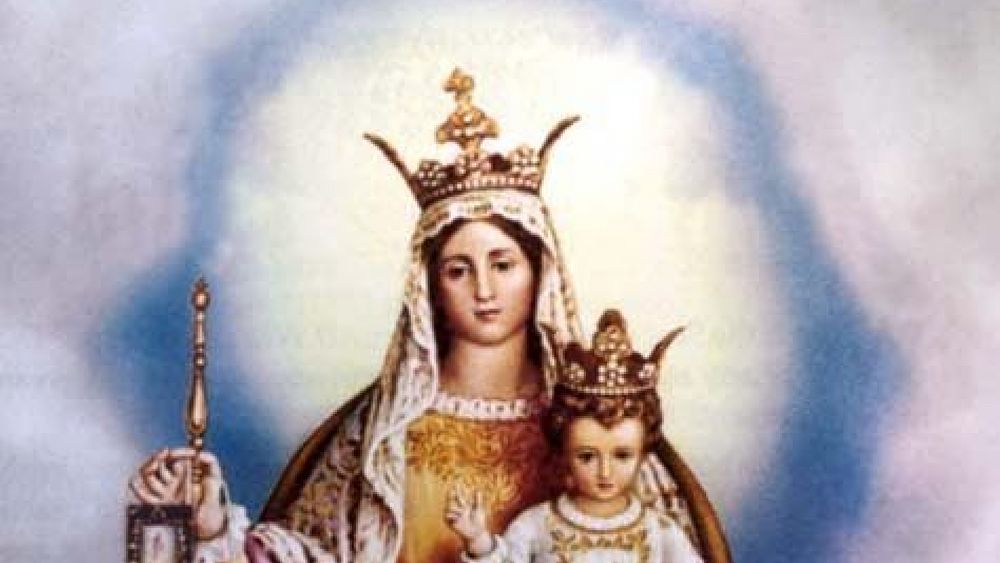A powerful devotion to do: the Carmelite Scapular
PROMISE of the MADONNA to S. SIMONE STOCK:
The Queen of Heaven, appearing all radiant with light, on 16 July 1251, to the old general of the Carmelite Order, San Simone Stock (who had asked her to give a privilege to the Carmelites), offering him a scapular - commonly called «Abitino "- thus spoke to him:" Take very beloved son, take this scapular of your Order, a distinctive sign of my Brotherhood, privilege to you and to all the Carmelites. Whoever dies dressed in this habit will not suffer the eternal fire; this is a sign of health, of salvation in danger, of a covenant of peace and an everlasting pact ».
Having said this, the Virgin disappeared in a perfume of Heaven, leaving the pledge of her First "Great Promise" in the hands of Simon.
We must not believe in the least, however, that the Madonna, with her Great Promise, wants to generate in man the intention of securing Heaven, continuing more quietly to sin, or perhaps the hope of being saved even without merit, but rather than by virtue of Her Promise, She works effectively for the conversion of the sinner, who brings the Habitant to the point of death with faith and devotion.
Terms
** The first scapular must be blessed and imposed by a priest
with a sacred formula of consecration to the Madonna
(it is excellent to go and request the imposition of it at a Carmelite convent)
The Abbitino must be kept, day and night, on the neck and precisely, so that one part falls on the chest and the other on the shoulders. Whoever carries it in his pocket, purse or pinned on his chest does not participate in the Great Promise
It is necessary to die dressed in the sacred dress. Those who have worn it for life and on the point of dying take it off do not participate in the Great Promise of Our Lady
When it should be replaced, a new blessing is not necessary.
The fabric scapular can also be replaced by the Medal (Madonna on one side, S. Heart on the other).
SOME CLARIFICATIONS
The Habitat (which is nothing but a reduced form of the dress of Carmelite religious), must necessarily be made of woolen cloth and not of another cloth, square or rectangular in shape, brown or black. The image on it of the Blessed Virgin is not necessary but is of pure devotion. Discoloring the image or detaching the Abitino is the same.
The consumed Habit is conserved, or destroyed by burning it, and the new does not need a blessing.
Who, for some reason, cannot wear the woolen Abbit, can replace it (after wearing it of wool, following the imposition made by the priest) with a medal that has on one side the effigy of Jesus and His Sacred Heart and on the other that of the Blessed Virgin of Carmel.
The Abino can be washed, but before removing it from the neck it is good to replace it with another or with a medal, so that you never remain without it.
Commitments
Special commitments are not prescribed.
All the exercises of piety approved by the Church serve to express and nourish devotion to the Mother of God. However, the daily recitation of the Holy Rosary is recommended.
Partial indulgence
The pious use of the Scapular or Medal (for example a thought, a call, a look, a kiss ...) as well as promoting union with Maria SS. and with God, he gives us a partial indulgence, the value of which increases in proportion to the dispositions of piety and fervor of each one.
Plenary indulgence
It can be purchased on the day the Scapular is received for the first time, on the feast of the Madonna del Carmine (16 July), S. Simone Stock (16 May), Sant'Elia prophet (20 July), Santa Teresa of the Child Jesus (1 October), of Santa Teresa d'Avila (15 October), of all the Carmelite Saints (14 November), of San Giovanni della Croce (14 December).
The following conditions are required for such indulgences:
1) Confession, Eucharistic Communion, prayer for the Pope;
2) promise to observe the commitments of the Scapular Association.
